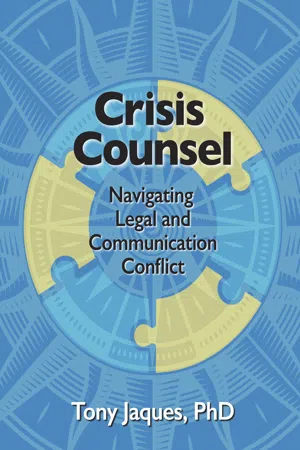
Crisis Counsel
Navigating Legal and Communication Conflict
Tony Jacques
- 389 pagine
- English
- ePUB (disponibile sull'app)
- Disponibile su iOS e Android
Crisis Counsel
Navigating Legal and Communication Conflict
Tony Jacques
Informazioni sul libro
Crisis Counsel: Navigating Legal and Communication Conflict, by Tony Jaques, Ph.D. is a new book by Rothstein Publishing.
This book is designed to provide hands-on, practical guidance for senior executives, lawyers and public relations professionals to navigate crises and to balance conflicting advice from lawyers and communication professionals while promoting open communication and protecting legal liability.
The book will help you to:
- Balance reputation protection and legal obligation during a crisis.
- Know why and how to apologize without increasing liability.
- Weigh legal and communications advice when a crisis strikes.
- Learn from original research which lets lawyers and communicators speak in their own words.
- Draw practical everyday lessons from real-world examples of conflict between lawyers and communicators.
- Navigate the legal and communication challenges of dealing with the media in a crisis.
- Motivate lawyers and communicators to work better together.
- Identify and avoid crucial areas of potential conflict from selected crisis case studies.
- Understand the essential difference between corporate responsibility and legal liability.
- Make decisions and do the right thing to protect your organization.
The book includes a wide variety of global case studies and examples while analyzing how legal and communications advice was managed and the impact on reputation. Crisis Counsel also includes interviews with four of the leading global experts on crisis management and the conclusions of a focused, unique global survey of senior lawyers.
Domande frequenti
Informazioni

Chapter One
Roles and Responsibilities:
Who Does What in a Crisis?
This chapter will help you to:
- Differentiate between the roles of lawyers and communicators.
- Identify and manage situations where legal and communications advice may come into conflict.
- Recognize genuine crises and potential crises as opposed to other management problems.
- Develop and implement workable protocols to minimize disagreements and deliver optimal solutions.
- Value differing viewpoints and secure the greatest benefits from those differences.
- Develop the skills to assess competing advice in a crisis and make informed decisions in the best interests of the organization as a whole.
The Nature of Crises
| Categories of Organizational Crises | |
| Operational crises | Arise from workplace incidents such as spills, leaks, fire or explosions, or from sabotage, onsite shooting, social unrest or even terrorism. |
| Environmental crises | When society is exposed to pollution, or release of toxic substances into the environment, such as lakes, waterways, groundwater or into the air. |
| Management or employee misconduct crises | Moral or ethical lapses, such as corruption, bribery, scandal, industrial espionage, theft or other criminal activity. |
| Management/legal crises | Such as layoffs or shutdowns, or alleged business wrongdoing including price-fixing, tax evasion, trademark or patent infringement, or unfair competition. |
| Technological crises | Technology failure or breakdown including computer systems crashing, breaches of privacy, hacking or loss of data. |
| Product crises | Product tampering or product failure, such as contamination, manufacturing error, or design fault causing illness, injury or even death. |
| Labor relations crises | Industrial disputes or employee allegations such as racial or sexual discrimination, bullying, wrongful dismissal, or dangerous working conditions. |
| Social concerns | Arise from concerns such as animal testing, genetically modified organisms, unsustainable packaging or suppliers who use exploited labor. |
| Natural disasters | When external events like floods, earthquakes, cyclones and wildfires trigger organizational crises by threatening facilities, raw material or markets. |
Avoiding the Legal Response Syndrome
Indice dei contenuti
- Cover
- Title page
- Copyright page
- WHAT YOUR COLLEAGUES ARE SAYING ABOUT CRISIS COUNSEL
- DEDICATION
- FOREWORD by DR. ROBERT HEATH
- FOREWORD by HELIO FRED GARCIA
- FOREWORD by Tony Langham
- Introduction Managing Conflicting Advice, and Why It’s Important
- Chapter One Roles and Responsibilities: Who Does What in a Crisis?
- Chapter Two Lawyers’ Insights
- Chapter Three Cases: Product Crises and Why They Hurt
- Chapter Four Why Should I Apologize?
- Chapter Five How to Apologize
- Chapter Six Case Studies: Patently Obvious Risk
- Chapter Seven Dealing With the Media
- Chapter Eight Doing What’s Right — Liability Versus Responsibility
- Chapter Nine Marathon Cases: In for the Long Haul
- Chapter Ten Talking to Global Experts
- Chapter Eleven What to Do Now
- Chapter Twelve Looking Forward — A Personal Perspective
- INDEX
- ABOUT THE AUTHOR